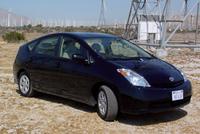Quantum Delivers Hydrogen Hybrid Vehicles to Riverside
IRVINE, Calif., Feb. 1, 2006 -- Quantum Fuel Systems Technologies Worldwide, Inc., today announced the delivery of five hydrogen-fueled Toyota Prius hybrid vehicles to the City of Riverside, California. This is part of a larger South Coast Air Quality Management District (AQMD) program to develop and demonstrate 30 hydrogen hybrid vehicles to fleets in Southern California. The formal delivery will take place during a ceremony to be held this afternoon at the City of Riverside's vehicle fleet yard.
Under contract to the AQMD, Quantum engineered a state-of-the-art OEM-caliber hydrogen fuel system, optimized the performance of the vehicle system, and performed accelerated long-term durability testing, including crash testing, to verify the design of the vehicles. The complete hydrogen internal combustion engine fuel system was developed by Quantum at its Advanced Vehicle Concept Center in Lake Forest, CA. Quantum executed the program as an OEM-level effort, including designing and producing the advanced hydrogen storage system, fuel injection system, and electronic controls. Quantum subjected the final design to extensive system optimization and vehicle verification testing to ensure super ultra low emission vehicle (SULEV) emissions performance, drivability, durability, and crash survivability of the hydrogen Priuses.
This event continues the formal rollout of the AQMD's hydrogen hybrid vehicle fleet and infrastructure demonstration program. The AQMD initiated this effort to establish a network of hydrogen fueling stations and deploy a fleet of hydrogen hybrid vehicles. A key benefit of this program will be the opportunity to educate the public on the use and safety of hydrogen as a fuel through its demonstration in vehicles with which the public is already familiar.
Riverside is one of five cities partnering with the AQMD to demonstrate five hydrogen-fueling stations and a total of 30 hybrid Priuses, with internal combustion engines that have been modified by Quantum to burn gaseous hydrogen. In addition to Riverside, the demonstration sites for the vehicles will include the cities of Burbank, Ontario, Santa Ana, and Santa Monica, as well as the AQMD headquarters in Diamond Bar. Each city and the AQMD will operate five hydrogen-fueled Priuses for five years.
"Quantum is excited to see the hydrogen hybrid Priuses hit the streets of Riverside. We look forward to supporting the City and the AQMD through this demonstration program," said Alan P. Niedzwiecki, President and CEO of Quantum. "Headquartered in Irvine, California and well aware of the air quality challenges before us, Quantum has established itself as a technology leader in hydrogen, hybrid, and alternative fuel technologies that promise to be key elements in helping the AQMD achieve healthful air quality in Southern California."
About Quantum:
Quantum and its subsidiary, Tecstar Automotive Group, are leaders in powertrain engineering, system integration, and manufacturing of packaged fuel systems and accessories for specialty vehicles and applications including fuel cells, hybrids, alternative fuels, hydrogen refueling, new body styles, mid-cycle vehicle product enhancements and high performance engines and drive trains for OEMs and consumers of aftermarket parts and accessories. Quantum also designs and manufactures hybrid and fuel cell vehicles.
Quantum has product commercialization alliances with General Motors, AM General, and Sumitomo. Quantum's customer base includes General Motors, Toyota, Opel, Hyundai, Suzuki, Ford, DaimlerChrysler, AeroVironment, and the U.S. Army.
More information can be found about Quantum's products and services at www.qtww.com.
About AQMD:
The AQMD is the air pollution control agency for Orange County and the major portions of Los Angeles, Riverside and San Bernardino counties. This area of 11,000 square miles is home to more than 16 million people -- about half the population of the State of California. It is the second most populous urban area in the United States. AQMD is responsible for controlling emissions from stationary sources of air pollution and has transportation-related programs aimed primarily at reducing mobile source emissions and promoting the use of cleaner fuels and vehicles.



